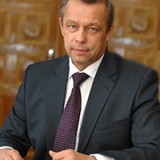UDC: 331.108.2:[005.7:334.7]
BBC: У291.212.1-551
Prokopiev A.V., Chernysheva T.N.
Participation of Innovative Personnel in the Implementation of Management Functions in the Organization
Keywords: human capital, innovations, innovative personnel, management functions, management, motivation, stimulation
The article deals with the problem of the participation of innovative personnel in the implementation of management functions in an organization. The purpose of the study is to identify the role of innovative personnel in the implementation of management functions in an organization. Materials and research methods used in the article: monographic, historical, expert, induction and deduction, analysis and synthesis, systematic approach. Research results. The involvement of employees in management in economic science began to be considered from the end of the first half of the 20th century. Later, the idea was developed within the framework of the concept of participatory management and since the 1980s began to be actively used in manufacturing organizations. A modern organization is subject to constant multidirectional influence of the external and internal environment. A quick response to these impacts allows the organization not only to maintain its competitiveness, but also to become a leader in the market. For rapid and qualitative changes, innovations are needed, with the help of which the processes of positive changes in the organization will be revolutionary. Innovative personnel, consisting of innovative employees, in an organization can be involved in the implementation of management functions, thereby bringing it certain benefits in the form of more flexible problem solving, innovative proposals for current activities and non-standard solutions to emerging issues. Conclusions. The participation of innovative personnel in management gives certain advantages to the organization. This direction of cooperation is chosen primarily by organizations located in highly competitive markets, where decisions must be made taking into account all aspects of the market environment, including uncertainty, risk, competitors' actions, the impact of scientific and technical progress, global transformations, etc. For the effective implementation of this area of activity, the management in the organization must create the necessary conditions that will contribute to the competent work of innovative personnel to reveal their creative and innovative capabilities in the field of tasks to be solved.
References
- Ardzhiris K., Nikols R., Stivens L., Bartolome Effektivnoe delovoe obshchenie [Effective business communication]. Moscow, Al’pina Biznes Buks Publ., 2006, 112 p.
- Isikava K. Yaponskie metody upravleniya kachestvom [Japanese quality management methods]. Moscow, Ekonomika Publ., 1988, 199
- Klyuchko V.N. Uchastie rabotnikov v pribyli i kapitale kompanii: istoriya i perspektivy [Participation of employees in profits and capital of the company: history and prospects]. Menedzhment v Rossii i za rubezhom, 2016, no. 4, pp. 33–42.
- Alekseev A.S., Panteleev S.S., Golodaev D.M., Savina A.O. et al. Osobennosti sovremennogo rossiiskogo stilya upravleniya [Features of the modern Russian management style]. Nauchno-metodicheskii elektronnyi zhurnal Kontsept, 2016, vol. 43, pp. 180–184. Available at: http://e-koncept.ru/2016/76446.htm (Accessed Date: 2023, Jan. 04).
- Prokopev A.V., Chernyshova T.N. Sovremennye metody obucheniya personala v organizatsii i ikh vliyanie na razvitie chelovecheskogo potentsiala [Modern methods of personnel training in the organization and their impact on the development of human potential]. Vestnik Altaiskoi akademii ekonomiki i prava, 2021, no. 4-2, pp. 236–243. Available at: https://vaael.ru/ru/article/view?id=1672 (Accessed Date: 2023, Jan. 06).
- RisinE. Ekonomika uchastiya: problemy teorii i praktiki [Participation economy: problems of theory and practice]. Voronezh, Voronezh University Publ., 108 p.
- Skriptunova E.A., Mukhametshina E.F. Partisipativnye struktury [Participatory structures]. Aksioma, 2008, no. 1, p. 16.
- Alderfer C.P. An empirical test of a new theory of human needs. Organizational Behavior and Human Performance. 1969, vol. 4 (2), pp. 142–175. DOI: https://doi.org/10.1016/0030-5073(69)90004-X/
- Follett M.P. Dynamic Administration. N. Harper & Brothers Publ., 1927 (reprint 1942), 328 p.
- Likert R. The Human Organization: It’s Management and Value. N.Y., McGraw-Hill, 1967, 258
- Maslow A.H. A Theory of Human Motivation. Psychological Review, 1943, vol. 50 (4), pp. 370–396. DOI: https://doi.org/10.1037/h0054346.
- Mayo E. The Human Problems of an Industrial Civilization. Routledge, 1933 (reprint 2003), 208 p.
- McClelland D.C. Human Motivation. N.Y., CUP Archive, 1987, 663 p.
- McGregor D. The Professional Manager. N.Y., McGraw-Hill, 1967, 202 p.
- West M. Sparkling fountains or stagnant ponds: an integrative model of creativity and innovation implementation in work groups. Applied Psychology: An International Review, 2002, vol. 51(3), pp. 355–387. DOI: 1111/1464-0597.00951.
About authors
- Prokopiev Aleksandr V.
- Candidate of Economics, Associate Professor of Management and Marketing Department, Chuvash State University, Russia, Cheboksary (loop711@mail.ru; ORCID: https://orcid.org/0000-0002-9225-3042)
- Chernysheva Tatiana N.
- Candidate of Economics Sciences, Associated Professor of Management and Marketing Department, Chuvash State University, Russia, Cheboksary (tolivanova@yandex.ru; ORCID: https://orcid.org/0000-0002-8232-6922)
Article link
Prokopiev A.V., Chernysheva T.N. Participation of Innovative Personnel in the Implementation of Management Functions in the Organization [Electronic resource] // Oeconomia et Jus. – 2023. – №1. P. 17-24. – URL: https://oecomia-et-jus.ru/en/single/2023/1/3/. DOI: 10.47026/2499-9636-2023-1-17-24.

